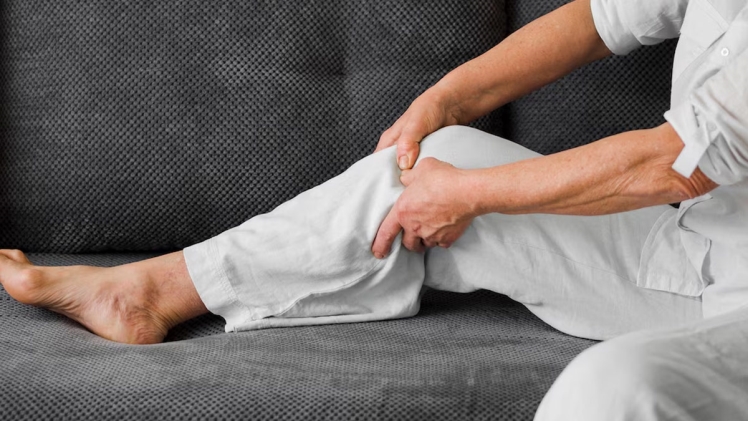Waking up in the middle of the night to the sharp, intense pain of a leg cramp is an experience many wish to avoid. These involuntary muscle contractions, often targeting the calves, thighs, or feet, can disrupt a peaceful night’s sleep and leave lingering soreness. To combat this discomfort, it’s essential to look into what causes cramps in the leg at night and explore comprehensive strategies for relief and prevention. This article aims to shed light on the multifaceted nature of nighttime leg cramps, examining potential causes, lifestyle modifications for prevention, immediate relief methods, and the role of general medication in managing this condition.
Understanding Nighttime Leg Cramps
Nighttime leg cramps can disrupt sleep patterns and lead to fatigue and daytime drowsiness, impacting overall well-being and productivity. Some individuals may experience these cramps sporadically, while others experience them frequently and distressingly, significantly affecting their quality of life. Furthermore, the discomfort and pain associated with nighttime leg cramps can also contribute to anxiety and stress surrounding sleep, creating a vicious cycle of sleep disturbances and muscle tension.
In addition to lifestyle adjustments and immediate relief strategies, individuals experiencing nighttime leg cramps may benefit from exploring relaxation techniques such as yoga, meditation, or deep breathing exercises. These practices help lower muscle tension and promote relaxation, potentially decreasing the likelihood of cramps. Moreover, maintaining consistent sleep timing and making a relaxing bedtime routine can aid in better sleep quality and reduce the incidence of nighttime leg cramps. Individuals experiencing frequent or severe nighttime leg cramps should consult with a professional for proper evaluation and personalised treatment recommendations. In some cases, underlying medical conditions such as nerve disorders or circulation issues may contribute to leg cramps, necessitating targeted intervention. By addressing underlying health concerns and implementing appropriate management strategies, individuals can alleviate nighttime leg cramps and improve their overall sleep experience.
Potential Causes of Nighttime Leg Cramps
Nighttime cramps can be caused by various sources, ranging from lifestyle choices to medical conditions. Dehydration and electrolyte imbalances are frequent contributors, directly impacting muscle function. Sedentary lifestyles, or, conversely, muscle overexertion, can also predispose individuals to cramps. Moreover, certain medications and medical disorders, such as diabetes and peripheral artery disease, might increase the likelihood of experiencing these painful spasms. Identifying and addressing these underlying factors is a vital step toward reducing the occurrence of leg cramps.
Lifestyle Adjustments for Prevention
Preventing nighttime leg cramps often involves adopting healthier lifestyle habits. Ensuring adequate hydration throughout the day and consuming a diet rich in essential minerals like potassium, magnesium, and calcium can fortify muscle health. Incorporating regular, gentle exercise into one’s routine, especially exercises stretching and strengthening muscles, can also mitigate the risk of cramps. When applied consistently, these preventative measures can significantly diminish the frequency and severity of leg cramps, promoting uninterrupted sleep and overall well-being.
Immediate Relief Strategies
Several strategies can offer immediate relief when confronted with a leg cramp. Gentle stretching of the affected muscle, careful massaging, and applying heat are all effective methods for easing the contraction and alleviating pain. These techniques work by relaxing the muscles and improving blood flow to the area, helping to resolve the cramp quickly. Maintaining a proper sleep environment, such as ensuring comfortable bedding and sleeping positions, can also help reduce the occurrence of nighttime leg cramps.
The Role of Medication
In some cases, lifestyle modifications and immediate relief strategies may not suffice, prompting individuals to turn to general medication for additional support. Drugs and supplements that support muscle health and address electrolyte imbalances can be beneficial. Some medicines may combine magnesium, Viburnum Opulus, Vitamin B, rutin, and additional compounds like Ginkgo Biloba, feverfew extract, and nicotinamide. Such medications can target multiple aspects of cramp relief and overall muscle health. This combination ensures that various mechanisms address the underlying causes of cramps, such as electrolyte imbalances, muscle tension, and vascular issues. Therefore, such drugs could provide more effective and holistic relief for individuals suffering from muscle cramps, promoting better muscle function, flexibility, and overall well-being. These holistic approaches aim to improve overall muscle function and promote relaxation, potentially reducing the frequency and severity of nighttime leg cramps over time.
Conclusion
In conclusion, nighttime leg cramps, while common, can impact one’s quality of sleep and overall quality of life. By exploring and understanding what causes cramps in the leg at night, individuals can take proactive steps towards prevention and effective management. Through lifestyle adjustments, employing immediate relief strategies, and considering the use of general medication under professional guidance, it’s possible to mitigate the frequency and intensity of these unwelcome disturbances. Adopting a holistic approach to managing nighttime leg cramps can pave the way for more restful nights and rejuvenated mornings, free from the discomfort of muscle cramps.

